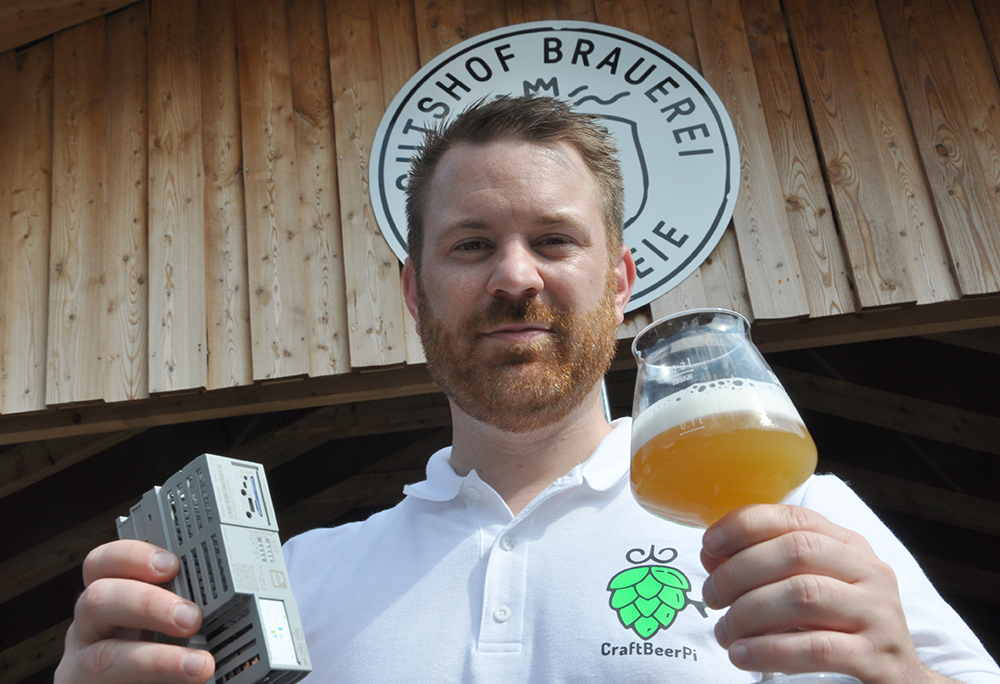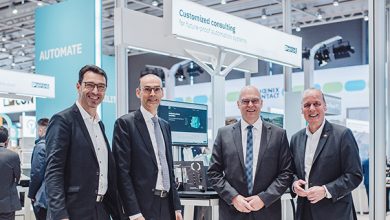This story really bubbles. And hisses. And ferments. Because when it comes to Manuel Fritsch and his controllers, the result of his programming skills is a fine craft beer. Home-brewed. And optimized with Facebook.

The German Purity Law is the oldest food law regulation in the world that is still in effect today. In 1516, the Bavarian Duke Wilhelm IV issued the decree that beer could be brewed using only hops, malt, yeast, and water. What would the Bavarian have to say if he met Manuel Fritsch?
Because he brews beer with ingredients that mostly come to him from online shops, programs automated brewing processes on microcomputers, and maintains his own community of more than 5,000 followers on Facebook. Poor Manuel Fritsch would probably have been accused of witchcraft back then. With horrible consequences.

Witchcraft is not so far off when the 36-year-old software engineer takes a seat at his computer. It’s not just good home-brewed beer Manuel Fritsch has a weakness for. He lets on to us that he actually loves to write programming code. And that is really suspicious!
A background in ATMs
How does a likable and normal-seeming person end up with the strange combination of two such unusual occupations? “I just felt like it,” Fritsch replied to the questions in conversation. His desire to program seems almost normal, considering that before the Eastern Westphalian started his job at Phoenix Contact, he worked in other countries for many years on software projects involving ATMs. “I really did go almost everywhere, because there are ATMs almost everywhere.”
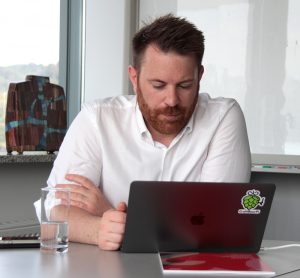
Working with software was therefore already necessary for professional reasons. A big pinch of internationality, ideas, and exchange within communities were added at zero cost.
Fritsch contributed lateral thinking to projects such as “The ATM and Payment Systems of the Future”. At Phoenix Contact, the smartly bearded man works as a project manager on a software rollout.
Beer with YouTube
But why beer? And why brew it yourself? “I liked cooking and I cooked a lot. And grilling,” Fritsch grins. “I’ve even been on the German version of the TV show “Come Dine with Me”, “Das perfekte Dinner”. And brewing beer just sounded interesting.”
So there’s no old beer baron dynasty in his family history? Or a brewer for a best friend? “No, not at all. I just really liked the idea. And back then, I had just started working with a Raspberry Pi, and wanted to do something useful with it.” And the necessary expertise? The almost alchemistic devotion to Germany’s favorite drink? “A specialist book on Amazon and a few videos on YouTube, then I just set out and learned more every day,” Fritsch says, demystifying the art of beer brewing.
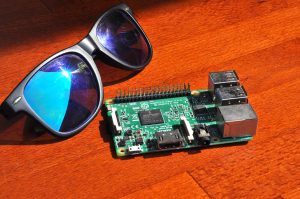
On the tiny computer with just a single printed circuit board, which doesn’t even have a housing and costs only a little more than € 30, Fritsch programmed his first application, which allowed a temperature sensor to be read out and a relay to be switched. “That was all that was needed for me to take the first steps toward controlling my brew kettle.” As soon as it reached a certain temperature, the relay switched off the heating. Incidentally, the “brewing copper” was a converted rice cooker. And the program was finished in just one weekend…
Creativity from the community
“I then shared my experiences with this application in a beer brewing community. At first, there were a lot of negative comments. I just had a different approach than what they were used to. My goal was to get something working and up and running with no more than 1,000 lines of code.” What sounds like a big deal to the layman is not really that much in the world of software developers. Larger software modules quickly require several hundred thousand lines.
“Besides, I look at things from the viewpoint of the user in my projects. I’m user interface-oriented, that’s just the way I am. Quite simply, it has to be easy to operate. That was quite unusual back then.” Manuel Fritsch integrated a mixer unit into his setup; a WLAN module that comes as standard in the
Raspberry Pi turned his smartphone into a control panel.
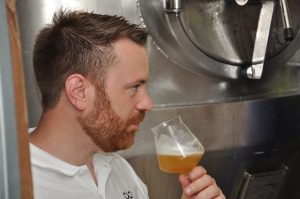
“Brewers want to brew beer and do not want to deal with programming,” is how Fritsch describes his approach. He published his efforts and the program on the community platform, following the open source ideal. Though the reaction was scathing at first, the mood then turned positive. “The community was really grateful that someone was offering a functioning control system that cost around € 100 at the time.”
Housing from Ikea
The beer brewer hobbyist then began to not only refine his beer, but also to install his controllers (“the first was on a wooden board,” he says) and to standardize them. “The audience became more and more international. And that’s when I had the idea of starting my own community.”
Manuel Fritsch chose Facebook (“easy-to-use, international, widespread”) as his platform, and named his group “CraftBeerPi”. Through this group, he is in contact with beer brewers around the world. Anyone who takes a peek over the blue Facebook fence is fascinated by the commitment and inventiveness of people whose passion is brewing beer themselves.
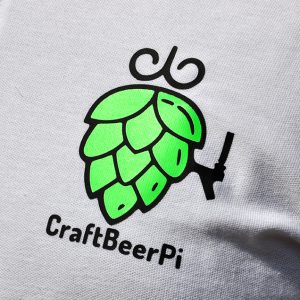
“How creative people are, what kind of solutions are developed — you would never think of it on your own.” A Norwegian user, for example, supported him in developing the logo. In the early days, an “ideal housing” quickly made the rounds: “A pharmacy cabinet from Ikea. Cheap and available worldwide.”
Python instead of machine language
Meanwhile, Fritsch is about to launch the fourth version of his beer-brewing software. There is also a CraftBeerPi extension board, a specially developed printed circuit board which is snapped onto the Raspberry Pi and which offers significantly more functionality and its own control logic. “I have developed an internal software event bus system that allows the different components to communicate with each other as required.” It can also be used to monitor the fermentation process. All of the programming is in the high-level language Python.
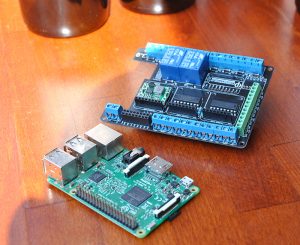
As a result, “CraftBeerPi” has become one of the top three controllers for hobby breweries worldwide. In around 76 countries, they ensure that water, hops, and yeast are transformed into tasty beverages. At the time of the interview, 6,667 installations had been set up, and around 200 more are added each month. “This is a booming market,” says Fritsch. “The more a beer from a brewery needs to taste the same (in other words, to be more reproducible), the more the production processes need to be standardized and therefore automated.”
Entry into the professional league
Manuel Fritsch wouldn’t be Manuel Fritsch if he wasn’t also open to alternatives. “Naturally, the controllers can also control other things. There are installations in cheese dairies and distilleries.” Fritsch only became acquainted with the field of industrial controllers through his work at
Phoenix Contact. Once he got his hands on a controller with PLCnext Technology (“for laymen, this is the most difficult part of it all”), it took him just under four hours to get the brewing process running on the professional controller. “This was possible because the controller can handle high-level language, thanks to its open architecture.”
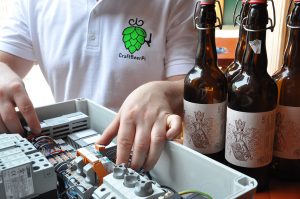
Programming in machine language would also be possible, but would greatly limit the circle of developers. “Using machine language would complicate the controller for the microbrewer. And then the community, with all its creativity, would be left out.” Which is not an alternative for Manuel Fritsch. The software alchemist can’t practice witchcraft, after all.
Home and microbreweries
In the world of beer brewers, a distinction is made between home or hobby brewers, microbreweries such as Hannover’s “Das Freie”, and large breweries. The boundaries are fluid. But the processes are very similar:
Brewing takes eight to ten hours; the batch brewed by hobby brewers is usually no more than 25 liters. The extract obtained from this process is then diluted and fed with hop pellets during the wort boiling process. The mixture is then cooled and the fermentation process begins. This takes around two weeks, with the temperature kept as constant as possible.
In Germany, preparing your own beer recipes was banned for a long time. Today, each household is allowed to produce up to 200 liters of beer per year tax-free.
